50% Off – Sale Ends Tomorrow
50% Off – Sale Ends Tonight
Now 50% Off for a Limited Time
Unlock Healing for Trauma Patients with Compassion-Based Therapy
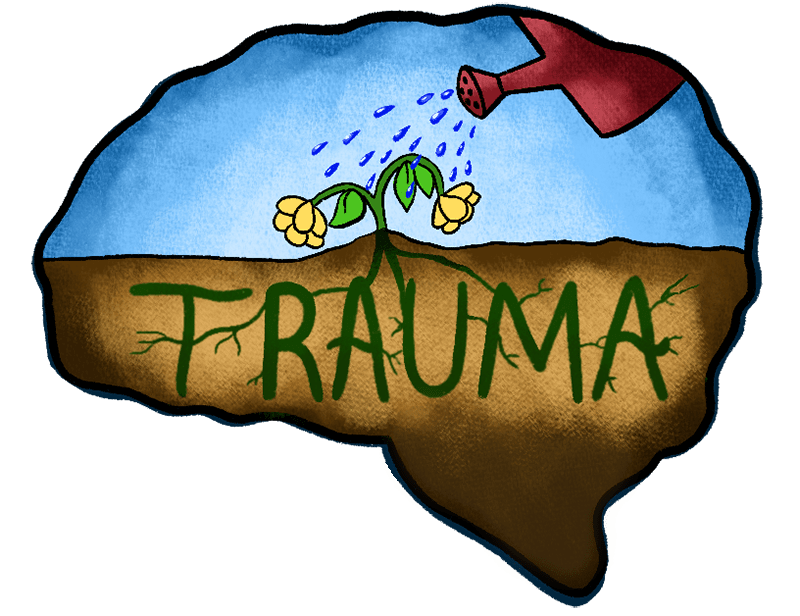
 Working with trauma is some of the toughest work we do, both on us as practitioners and our patients.
Working with trauma is some of the toughest work we do, both on us as practitioners and our patients.
But compassion-based therapies can enhance your interventions and support your clients through the difficult work of processing trauma.
Research suggests that compassion practice can act as a buffer against the harmful effects of trauma. It can help your client develop skills to approach traumatic memories without getting caught up in a threat response during your session.
Compassion practices can even equip your clients to repair ruptures following inadequate childhood attachment.
So how do we integrate compassion-oriented therapies into treatment and build a client’s capacity to process trauma?
We turned to the world’s leading experts in compassion-based therapy and asked them to share their best approaches for working with trauma.
Expert Strategies for Integrating Compassion-Based Approaches into Trauma Treatment

How to Build Your Client’s Capacity for Compassion (and Why That Can Help Them Process Trauma)
Deborah Lee, DClinPsy Christopher Willard, PsyD
Christopher Germer, PhD Emiliana Simon-Thomas, PhD
Susan Pollak, MTS, EdD Kristin Neff, PhD
- The Dramatic Impact of Self-Compassion on PTSD
- Why Compassion-Based Approaches Are So Effective for Helping Patients Process Trauma
- What to Do When Early Childhood Trauma Has Compromised Your Patient’s Ability to Practice Self-Compassion
- How to Help Patients Cultivate Self-Compassion to Repair Attachment Ruptures
- A Powerful Metaphor to Help Patients Open Up to Self-Compassion After Trauma

Three Key Steps for Integrating Compassion-Based Approaches into the Treatment of Trauma
Dennis Tirch, PhD Deborah Lee, DClinPsy
Laura Silberstein-Tirch, PsyD
- Crucial Steps to Take Before Applying Compassion-Oriented Approaches to Your Patient’s Traumatic Memories
- How to Use Compassionate Mind Training to Work with the Remnants of Trauma
- How to Help Your Patient Bring Compassion to Traumatic Memories
- The Game-Changing Power of Identifying “Safety Strategies” That Are Harming Your Client’s Relationships

How to Integrate Self-Compassion into the Three Stages of Trauma Treatment
Christopher Germer, PhD Susan Pollak, MTS, EdD
- Why Compassion Can Be So Effective in Helping Clients Reconnect with the World
- How Compassion Can Build Your Client’s Internal Resources and Their Capacity for Processing Trauma

Strategies to Help Patients When Trauma Creates Blocks to Compassion
Kristin Neff, PhD Christopher Germer, PhD
Laura Silberstein-Tirch, PsyD Jack Kornfield, PhD
Christopher Willard, PsyD Dennis Tirch, PhD
- How to Use Your Patient’s Blocks and Fears to Build Compassion-Based Skills
- Two Key Phrases for Working with “Backdraft” in Self-Compassion
- How Compassion Can Cultivate Courage and Accelerate Post-Traumatic Growth
- How to Use Compassion as Motivation for Transformation

Critical Insights: Integrating Compassion into the Treatment of Trauma
Kelly McGonigal, PhD Ron Siegel, PsyD Ruth Buczynski, PhD
- The Role Oxytocin Can Play When Integrating Compassion into Trauma Work
- Why Some Patients Experience a “Vulnerability Hangover” After Compassion Practice – and How to Mitigate It
- The Key Factor That Can Make Self-Compassion Sustainable for Patients Who Have Experienced Trauma
- Compassion-Based Practices to Help Patients Feel Safe and Accepted
- Specific De-Shaming Language to Normalize a Client’s Response to Trauma

Concrete Compassion-Based Strategies for Addressing Trauma (and How to Integrate Them into Your Work)
Rick Hanson, PhD Deborah Lee, DClinPsy Ashley Vigil-Otero, PhD
- Self-Compassion Skills Patients Can Use to Create a Sense of Safety
- Practical Exercises That Can Bring Compassion to Your Patient’s Trauma Story
- Two Specific Ways to Use Psychoeducation to Help Patients Process Traumatic Memories
- How to Apply Compassionate Imagery to Help Patients Create an Internal Support System
- Three Key Compassion-Based Ways to Help Patients Expand Their Window of Tolerance
Register Here for $197 $97
and get all the videos, audios, transcripts, learning tools, plus 4 bonuses
to help you apply compassion more effectively to trauma therapy
3.25 CE/CME Credits or Clock Hours are available for purchase at checkout.
Click HERE to get information about CE/CME credits and clock hours as well as speaker disclosures
For This Short Course, We Brought Together Some of the Top Experts in the Field

Chris Germer, PhD
Co-developer of the Mindful Self-Compassion (MSC) program; Founding faculty member of the Institute for Meditation and Psychotherapy and the Center for Mindfulness and Compassion; Lecturer on psychiatry (part-time) at Harvard Medical School.

Kristin Neff, PhD
Professor of Human Development and Culture, Educational Psychology Dept, University of Texas at Austin; Expert in Self Compassion.

Dennis Tirch, PhD
Founding Director of The Center for Compassion Focused Therapy; President of The Compassionate Mind Foundation of North America; co-author of Experiencing ACT from the Inside Out: A Self-Practice/Self-Reflection Workbook for Therapists.

Jack Kornfield, PhD
Co-founder of the Insight Meditation Society and Spirit Rock Meditation Center; Author of The Wise Heart and Bringing Home the Dharma: Awakening Right Where You Are.

Deborah Lee, DClinPsy
Consultant clinical psychologist at Berkshire Traumatic Stress Service; honorary senior lecturer at University College London; co-author of The Compassionate-Mind Guide to Recovering from Trauma and PTSD.

Christopher Willard, PsyD
Psychologist and educational consultant specializing in mindfulness; president of the Mindfulness in Education Network; serves on the board of directors at the Institute for Meditation and Psychotherapy.

Rick Hanson, PhD
Senior Fellow of the Greater Good Science Center at UC Berkeley; New York Times bestselling author of Hardwiring Happiness and Buddha’s Brain.

Susan Pollak, MTS, EdD
Licensed clinical psychologist in private practice; co-founder and teacher at the Center for Mindfulness and Compassion at Harvard Medical School/Cambridge Health Alliance; author of Self-Compassion for Parents: Nurture Your Child by Caring for Yourself.
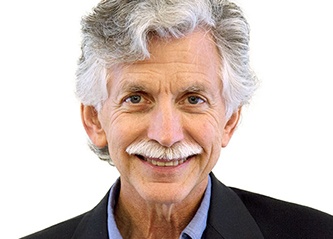
Ron Siegel, PsyD
Assistant Professor of Psychology, part time, Harvard Medical School; Author of The Mindfulness Solution: Everyday Practices for Everyday Problems and Sitting Together: Essential Skills for Mindfulness-Based Psychotherapy.

Kelly McGonigal, PhD
Health psychologist and lecturer at Stanford University; Author of The Upside of Stress: Why Stress Is Good for You and How to Get Good At It and The Willpower Instinct: How Self-Control Works, Why It Matters, and What You Can Do to Get More of It.

Paul Gilbert, PhD
Professor of Clinical Psychology at the University of Derby in the UK; World renowned for his work on compassion and compassion focused therapy; Author of The Compassionate Mind: A New Approach to Life’s Challenges.
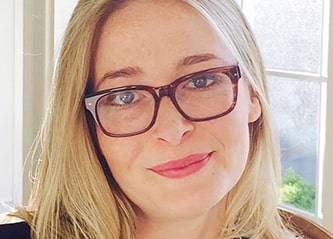
Laura Silberstein-Tirch, PsyD
Founding Director of The Center for Compassion Focused Therapy; Adjunct Assistant Professor at the Ferkauf School of Psychology, Albert Einstein College of Medicine of Yeshiva University; co-author of The ACT Practitioner’s Guide to the Science of Compassion.

Emiliana Simon-Thomas, PhD
Science director at UC Berkeley’s Greater Good Science Center; co-editor of the Oxford Handbook of Compassion Science; co-instructor for The Science of Happiness online program.

Course Director
Ruth Buczynski, PhD

Program Developer & Co-Host
Ashley Vigil-Otero, PsyD
Here's What You'll Get:
Everything is yours to keep forever in your professional library
|
|
Downloadable videos so you can watch at your convenience, on any device |
|
|
Audio recordings you can download and listen to at home, in the car, at the gym or wherever you like |
|
|
TalkBack Segments to distill key ideas (this is where we “land” the session) |
|
|
Next Week in Your Practice sessions to give you concrete strategies to use with patients |
|
|
Professionally-formatted transcripts of the sessions, to make review and action simple |
|
|
Four downloadable bonus videos to help you apply compassion more effectively to trauma therapy |
Get 4 Bonuses When You Buy Today

Two Strategies for Applying Compassion in the Treatment of Trauma
Christopher Germer, PhD Paul Gilbert, PhD
Laura Silberstein-Tirch, PsyD
- The Problem with Premature Forgiveness (and How to Help Clients Avoid It)
- How Compassionate Letter Writing Can Help Clients with Attachment Ruptures (and Strategies to Strengthen the Practice)

A Compassion-Based Approach to Exposure Therapy
Dennis Tirch, PhD
- The Benefit of Integrating Compassion-Based Treatments When Using Exposure Therapy
- Case Study: How Compassion-Based Therapy Helped One Man Confront the Pain of Medical Trauma

Three Specific Compassion-Based Interventions to Spark Change
Kristin Neff, PhD Christopher Germer, PhD
Dennis Tirch, PhD Susan Pollak, MTS, EdD
- How the “Yin” and “Yang” Aspects of Compassion Can Motivate Your Client
- How to Use Compassionate Letter Writing to Shift a Patient’s Perspective and Inspire Change
- One Simple Metaphor That Can Alleviate Client Suffering

How to Work with a Client’s “Inner Critic” When It Is the Voice of Their Abuser
Dennis Tirch, PhD
- Get Three Exercises to Work with the Internalized Voice of Your Client’s Abuser
Register Here for $197 $97
and get all the videos, audios, transcripts, learning tools, plus 4 bonuses
to help you apply compassion more effectively to trauma therapy
3.25 CE/CME Credits or Clock Hours are available for purchase at checkout.
Click HERE to get information about CE/CME credits and clock hours as well as speaker disclosures
Plus, You’ll Get Practical Tools to Help You Take Action Immediately and Effectively
Synthesize Key Concepts So You Can Use Them Immediately
In the TalkBack Session, Ron Siegel, PsyD and Kelly McGonigal, PhD join me to dig more deeply into the key ideas. Our job is to make yours easier by streamlining the information and making sure each point is crystal clear. We’ll clarify critical concepts and break it all down so you can gain confidence in your understanding.

Discover Concrete Practices That Will Work in Your Life (and with Your Patients)
Then, with “next week” in mind, we’ll turn smart ideas into easy-to-use applications for your work. In Next Week in Your Practice, Rick Hanson, PhD Deborah Lee, DClinPsy join Ashley Vigil-Otero, PhD to give you specific practices and exercises based on each session. You’ll get strategies you can use with your clients right away.

Uncover Core Ideas and Techniques at-a-Glance So You Have a “Cheat Sheet” When You Need It Most
The QuickStart Guide will help you stay fresh and confident as you turn these teachings into action. We’ve gathered all the essential tools and methods from the program into a concise, easy-to-use guide so you can quickly review and apply these ideas when you need them most. It’s an at-a-glance reference to the most powerful concepts and strategies for working with patients who have experienced trauma.
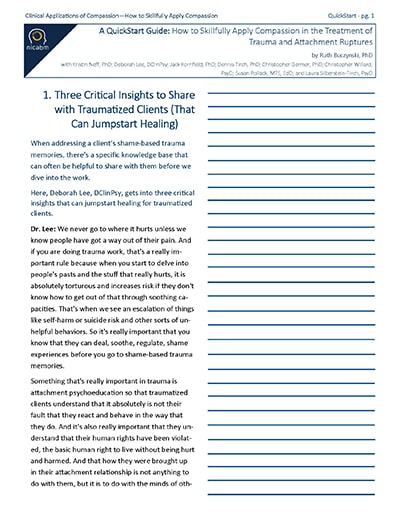
Quickly Recall Crucial Details So You Can Apply Them with Confidence
Our Professional Transcript will help you reinforce key ideas so you can integrate them into your life and work. We’ve designed your transcript with an easy-to-use table of contents, clear, organized formatting, and helpful highlight quotes so you’ll have the information and exercises you need at your fingertips.
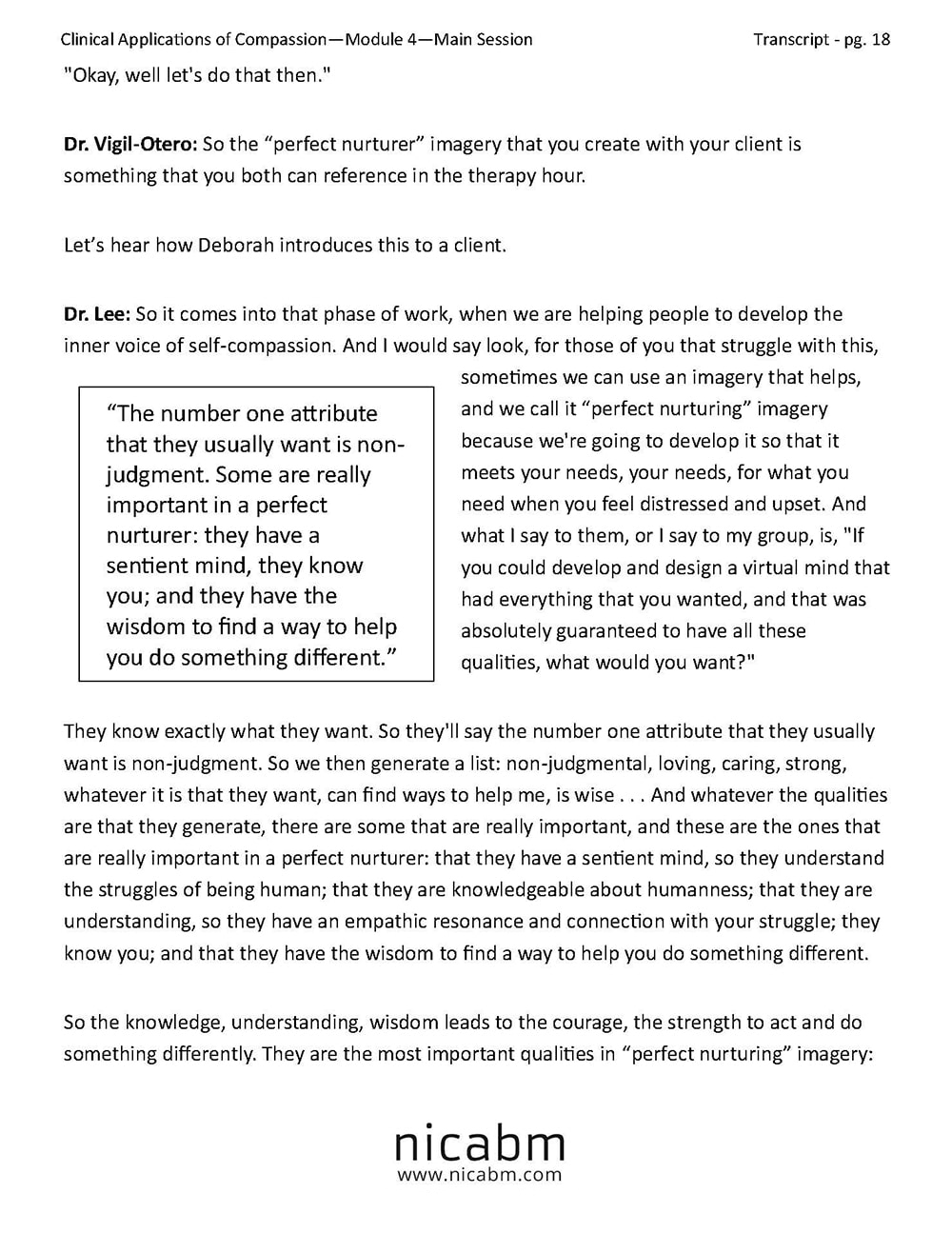
Here's What Your Peers Have Experienced In NICABM Programs

. . . instrumental in opening my mind and heart to understanding trauma.
“These seminars have been instrumental in opening my mind and heart to understanding trauma. They are brief and accessible and of such high quality that I’ve been able to glean real understanding and a starting point for further study. I can’t say enough about them. I have recommended them to so many of my colleagues and they say the same things I do about them. Thank you Ruth!”
Angela Lawrence, Drug and Alcohol Counselor
British Columbia, Canada

. . . very cost effective and practical . . .
“These programs offer a broad spectrum of both information and specific guidelines with top experts in different fields of addressing human suffering. All in a very cost effective and practical way. Rather than thousands of dollars spent on the cost of conference I can learn in the comfort of my own home or office, on my own schedule. Certainly recommend any of these series to my colleagues.”
Ian Macnaughton, PhD, Psychotherapist
Vancouver, BC, Canada

My clients have been able to build their confidence. . .
“My clients have been able to build their confidence in their ability to self-regulate on their own in pretty difficult situations, including work and family of origin situations. Their success has then built their self-esteem as they can see that they can be successful in changing some fairly habitual ways of interacting and hurting themselves. It is a positive cycle that builds upon itself”
Nancy Lasater, MSW, LCSW
Boulder, CO
Why the Transcript Is Essential:
- The transcript makes it easy to go back and double check concepts, citations and names that are mentioned
- We put in a table of contents to make it easy for you to find the exact part of the webinar you need
- Having the concepts already written allows you to take notes on how you’re going to use the ideas rather than transcribing the ideas
- Some people simply learn better by reading than by listening or watching
- You will be able to print out and share techniques presented in the session with your patients

“I really liked being able to follow along with the transcripts as I listened…it was nice not to feel like I had to take notes. I really feel like I remember more when I both hear and see at the same time.”
Mary Ellen McNaughton, Masters in Counseling, Psychology Counselor
Kelowna, British Colombia, Canada
You Are Protected By
NICABM’s Money-Back Guarantee
We invite you to register for this comprehensive training program without any risk. Unless you are completely satisfied, we will refund your money. Just let us know within 30 days from the date of registration. We are that confident that you will find this information to be more than you expected.
Register Here for $197 $97
and get all the videos, audios, transcripts, learning tools, plus 4 bonuses
to help you apply compassion more effectively to trauma therapy
3.25 CE/CME Credits or Clock Hours are available for purchase at checkout.
Click HERE to get information about CE/CME credits and clock hours as well as speaker disclosures
